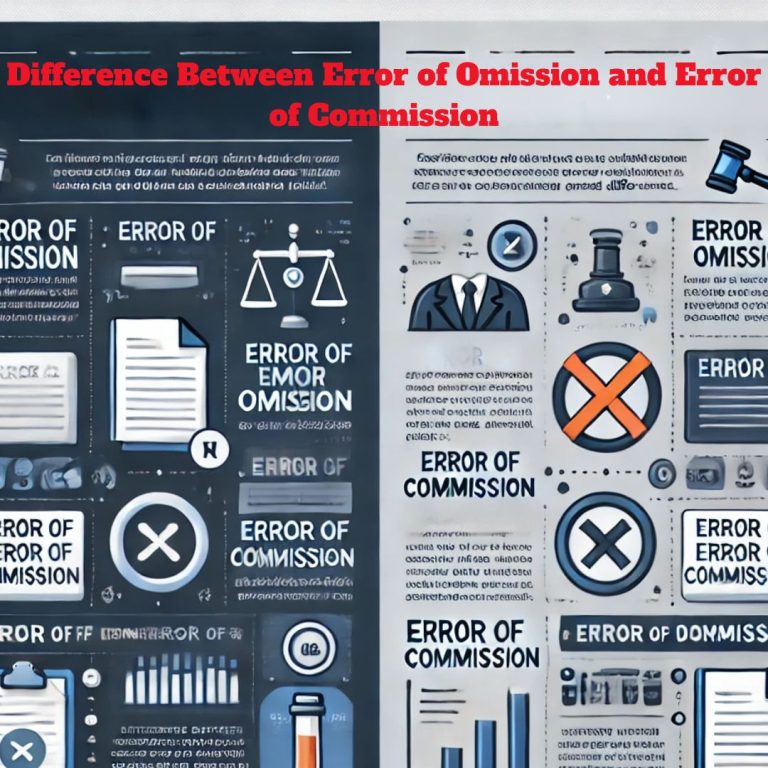The Difference Between Error of Omission and Error of Commission lies in the nature of the mistake and its impact on financial records. Errors of omission occur when a transaction is entirely or partially left out of the accounting books, while errors of commission involve incorrect recording of transactions due to clerical or human mistakes. Understanding these errors is crucial for maintaining accurate financial statements and ensuring compliance with accounting standards.
What Is Error of Omission?
An error of omission happens when a financial transaction is either wholly or partially excluded from the accounting records. These errors can occur during the recording, posting, or summarizing of transactions.
Types of Errors of Omission
- Complete Omission:
- The entire transaction is left unrecorded in the books.
- Example: A cash sale of $5,000 is not entered into the sales account.
- Partial Omission:
- Only one aspect of the transaction is omitted.
- Example: The cash receipt is recorded, but the corresponding revenue entry is missing.
Causes
- Oversight during data entry.
- Misplacement of source documents.
- Lack of proper communication within departments.
Impact
- Leads to inaccurate financial reports.
- May understate or overstate financial positions.
Rectification
- Verify source documents such as invoices and receipts.
- Conduct periodic audits to identify missing entries.
What is Error of Commission?
An error of commission occurs when a transaction is recorded incorrectly, either due to mathematical errors, posting to the wrong account, or other inaccuracies.
Types of Errors of Commission
- Clerical Errors:
- Arithmetic mistakes during calculations.
- Example: Adding $1,200 as $2,100 in the ledger.
- Posting Errors:
- Recording a transaction in the wrong account.
- Example: Recording rent expense under salaries.
- Recording Errors:
- Using incorrect figures during entry.
- Example: Entering $1,000 instead of $10,000.
Causes
- Lack of attention to detail.
- Insufficient knowledge of accounting principles.
- Rushed or careless data entry.
Impact
- Distorts account balances, leading to potential mismanagement of funds.
- Can affect decision-making based on inaccurate data.
Rectification
- Recheck ledger entries for discrepancies.
- Implement automated systems to minimize manual errors.
Difference Between Error of Omission and Error of Commission
An error of omission occurs when there is a complete omission or lack of a necessary transaction. An error of commission is when a transaction is recorded inaccurately. This generally affects the accuracy of financial records but differs as to nature and cause.
| Aspect | Error of Omission | Error of Commission |
| Definition | A transaction is omitted from the books. | A transaction is incorrectly recorded. |
| Nature | Complete or partial exclusion. | Misrecording or misposting. |
| Impact on Ledger | Transactions may not appear at all. | Transaction appears but with errors. |
| Examples | Missing a sale entry. | Recording sales under purchases. |
| Detection Difficulty | Hard to detect as no entry is present. | Easier to detect through mismatched accounts. |
Practical Implications
- Error of Omission: Can lead to understated revenues or expenses, affecting profitability analysis.
- Error of Commission: Misclassifications may distort specific accounts, leading to incorrect financial conclusions.
Conclusion
The Difference Between Error of Omission and Error of Commission underscores their unique characteristics and implications for financial accuracy. While errors of omission result from leaving out transactions, errors of commission stem from incorrectly recording them. Both types of errors can harm the reliability of financial statements, making their identification and rectification vital for sound accounting practices. Regular audits, robust systems, and proper training can help minimize these errors and maintain financial transparency.
Difference Between Error of Omission and Error of Commission FAQs
What are the common causes of errors of omission?
Errors of omission commonly occur due to oversight, misplacement of documents, or lack of communication.
How can errors of commission be detected?
Errors of commission can often be detected through reconciliations, trial balances, and detailed ledger reviews.
Which type of error is harder to identify?
Errors of omission are harder to identify as the transaction is entirely missing from records.
Can both errors affect financial statements?
Yes, both errors can distort financial statements, leading to inaccurate reports and potential compliance issues.
How can businesses reduce these errors?
Businesses can reduce these errors by implementing automated systems, regular training for staff, and periodic audits.


